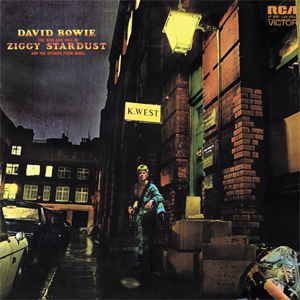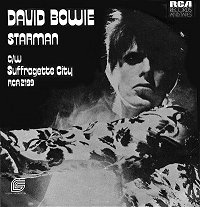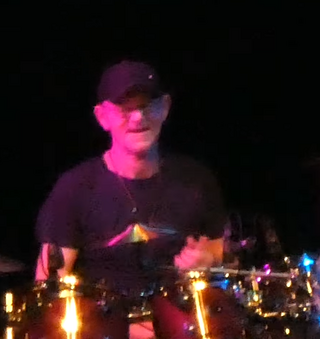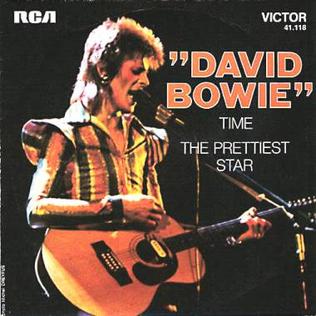Related Research Articles

The Rise and Fall of Ziggy Stardust and the Spiders from Mars is the fifth studio album by the English musician David Bowie, released on 16 June 1972 in the United Kingdom through RCA Records. It was co-produced by Bowie and Ken Scott and features Bowie's backing band the Spiders from Mars — Mick Ronson, Trevor Bolder and Mick Woodmansey. It was recorded from November 1971 to February 1972 at Trident Studios in London.

Aladdin Sane is the sixth studio album by the English musician David Bowie, released in the United Kingdom on 19 April 1973 through RCA Records. The follow-up to his breakthrough The Rise and Fall of Ziggy Stardust and the Spiders from Mars, it was the first album he wrote and released from a position of stardom. It was co-produced by Bowie and Ken Scott and features contributions from Bowie's backing band the Spiders from Mars — Mick Ronson, Trevor Bolder and Mick Woodmansey — with pianist Mike Garson, two saxophonists and three backing vocalists. Recorded in London and New York City between legs of the Ziggy Stardust Tour, the record was Bowie's final album with the full Spiders lineup.

"Life on Mars?" is a song by the English singer-songwriter David Bowie, first released on his 1971 album Hunky Dory. Bowie wrote the song as a parody of Frank Sinatra's "My Way". "Life on Mars?" was recorded on 6 August 1971 at Trident Studios in London, and was co-produced by Bowie and Ken Scott. Bowie's backing band consisted of guitarist and string arranger Mick Ronson, bassist Trevor Bolder, drummer Mick Woodmansey and Strawbs member Rick Wakeman on piano. "Life on Mars?" is primarily a glam rock ballad, with elements of cabaret and art rock; it has a complex structure that includes chord changes throughout. The lyrics are about a girl who goes to a cinema to escape reality, and include surreal images that reflect optimism and the effects of Hollywood.

"Suffragette City" is a song by the English singer-songwriter David Bowie. It was originally released in April 1972 as the B-side of the single "Starman" and subsequently appeared on his fifth studio album The Rise and Fall of Ziggy Stardust and the Spiders from Mars (1972). The song was later reissued as a single in 1976, with the US single edit of "Stay" as the B-side, to promote the compilation album Changesonebowie in the UK. Co-produced by Bowie and Ken Scott, it was recorded by Bowie at Trident Studios in London with his backing band the Spiders from Mars, consisting of Mick Ronson, Trevor Bolder and Mick Woodmansey, at a late stage of the album's sessions. The song was originally offered to English band Mott the Hoople, who declined it and recorded Bowie's "All the Young Dudes" instead. It is a glam rock song that is influenced by the music of Little Richard and the Velvet Underground. The lyrics include a reference to Anthony Burgess' novel A Clockwork Orange and the lyric "Oooohh wham bam, thank you, ma'am".

Pin Ups is the seventh studio album by the English musician David Bowie, released on 19 October 1973 through RCA Records. Devised as a "stop-gap" album to appease his record label, it is a covers album, featuring glam rock and proto-punk versions of songs by British bands from the 1960s that were influential to Bowie as a teenager, including the Pretty Things, the Who, the Yardbirds and Pink Floyd.

The Man Who Sold the World is the third studio album by the English musician David Bowie, originally released through Mercury Records in the United States on 4 November 1970 and in the United Kingdom on 10 April 1971. Produced by Tony Visconti and recorded in London from April to May 1970, the album features the first appearances on a Bowie record of future Spiders from Mars members Mick Ronson and Mick Woodmansey.

"Starman" is a song by the English musician David Bowie. It was released on 28 April 1972 by RCA Records as the lead single of his fifth studio album The Rise and Fall of Ziggy Stardust and the Spiders from Mars. Co-produced by Ken Scott, Bowie recorded the song on 4 February 1972 at Trident Studios in London with his backing band known as the Spiders from Mars – comprising guitarist Mick Ronson, bassist Trevor Bolder and drummer Mick Woodmansey. The song was a late addition to the album, written as a direct response to RCA's request for a single; it replaced the Chuck Berry cover "Round and Round" on the album. The lyrics describe Ziggy Stardust bringing a message of hope to Earth's youth through the radio, salvation by an alien 'Starman'. The chorus is inspired by "Over the Rainbow", sung by Judy Garland, while other influences include T. Rex and the Supremes.
"Aladdin Sane (1913–1938–197?)" is a song by the English singer-songwriter David Bowie, the title track from his 1973 album Aladdin Sane. Described by biographer David Buckley as the album's "pivotal" song, it saw Bowie moving into more experimental musical styles following the success of his breakthrough glam rock release The Rise and Fall of Ziggy Stardust and the Spiders from Mars in 1972.

"John, I'm Only Dancing" is a song by the English musician David Bowie, originally released as a non-album single on 1 September 1972. A glam rock and R&B number, the lyrics describe a situation in which the narrator informs his lover not to worry about the girl he is with because he is "only dancing" with her. Although ambiguous, many interpreted it as concerning a gay relationship. Recorded in London in June 1972, it was boosted by a low-budget promotional video directed by Mick Rock. It reached number 12 in the UK; RCA refused to release it in America due to its suggestive lyrical content.

Michael "Woody" Woodmansey is an English rock drummer best known for his work in the early 1970s as a member of David Bowie's core backing ensemble that became known as the Spiders from Mars in conjunction with the release of Bowie's 1972 LP The Rise and Fall of Ziggy Stardust and the Spiders from Mars. With the death of Bowie in January 2016, Woodmansey became the last surviving member of the Spiders.
"Oh! You Pretty Things" is a song by the English singer-songwriter David Bowie from his 1971 album Hunky Dory. It was the first song he wrote for the album. Bowie recorded the song as a demo before giving it to singer Peter Noone, lead singer of Herman's Hermits, who decided to release it as his debut solo single. Featuring Bowie on piano, Noone's recording was produced by Mickie Most and featured structural and lyrical differences from Bowie's later version. Released by RAK Records in April 1971 under the title "Oh! You Pretty Thing", the single peaked at number 12 in the UK, becoming Bowie's biggest success as a songwriter since his own single "Space Oddity" two years earlier.
"Five Years" is a song by the English musician David Bowie, released on his 1972 album The Rise and Fall of Ziggy Stardust and the Spiders from Mars. Co-produced by Bowie and Ken Scott, it was recorded in November 1971 at Trident Studios in London with his backing band the Spiders from Mars − comprising Mick Ronson, Trevor Bolder and Mick Woodmansey. As the opening track on the album, the song introduces the overarching theme of the album: an impending apocalyptic disaster will destroy Earth in five years and the being who will save it is a bisexual alien rock star named Ziggy Stardust. While the first two verses are told from a child narrator's perspective, the third is from Bowie's, who addresses the listener directly. As the track progresses, it builds intensity, before climaxing with strings and Bowie screaming the title.

"Moonage Daydream" is a song by the English singer-songwriter David Bowie. It was originally recorded in February 1971 at Radio Luxembourg's studios in London and released as a single by his short-lived band Arnold Corns in May 1971 on B&C Records. Bowie subsequently re-recorded the song later that year with his backing band the Spiders from Mars—Mick Ronson, Trevor Bolder and Mick Woodmansey—for release on his 1972 album The Rise and Fall of Ziggy Stardust and the Spiders from Mars. The re-recording was co-produced by Ken Scott and recorded at Trident Studios in London in November 1971. The re-recording is a glam rock song that uses melodic and harmonic hooks, as well as percussion and guitar influenced by heavy metal. On the album, the song directly introduces the character Ziggy Stardust, who describes himself as a bisexual alien rock superstar who will save the Earth from the impending disaster described in the opening track "Five Years". It features saxophone played by Bowie and a guitar solo and string arrangement by Ronson.

"Ziggy Stardust" is a song written by the English singer-songwriter David Bowie for his 1972 album The Rise and Fall of Ziggy Stardust and the Spiders from Mars. Co-produced by Bowie and Ken Scott, he recorded it at Trident Studios in London in November 1971 with his backing band the Spiders from Mars—comprising Mick Ronson, Trevor Bolder and Mick Woodmansey. Lyrically, the song is about Ziggy Stardust, a bisexual alien rock star who acts as a messenger for extraterrestrial beings. The character was influenced by English singer Vince Taylor, as well as the Legendary Stardust Cowboy and Kansai Yamamoto. Although Ziggy is introduced earlier on the album, this song is its centrepiece, presenting the rise and fall of the star in a very human-like manner. Musically, it is a glam rock song, like its parent album, and is based around a Ronson guitar riff.

"Velvet Goldmine" is a song by the English singer-songwriter David Bowie. A glam rock number with lyrical references to oral sex, it was originally recorded on 11 November 1971 at Trident Studios in London during the sessions for his 1972 album The Rise and Fall of Ziggy Stardust and the Spiders from Mars. It was ultimately left off the album and subsequently released as a B-side of the UK re-release of "Space Oddity" in 1975. Praised by biographers as an undervalued classic, it later appeared on compilation albums, including on Re:Call 1, part of the Five Years (1969–1973) boxed set, in 2015. Its namesake was used for Todd Haynes's 1998 film of the same name.
"Watch That Man" is a song by the English musician David Bowie, the opening track on the album Aladdin Sane from 1973. Its style is often compared to the Rolling Stones' Exile on Main Street. The mix, in which Bowie's lead vocal is buried within the instrumental sections, has generated discussion among critics and fans.
"Panic in Detroit" is a song written by the English singer-songwriter David Bowie for the album Aladdin Sane in 1973. Bowie based it on his friend Iggy Pop's descriptions of revolutionaries he had known in Michigan and Pop's experiences during the 1967 Detroit riots. Rolling Stone magazine called the track "a paranoid descendant of the Motor City's earlier masterpiece, Martha and the Vandellas' "Nowhere to Run"".

"Time" is a song by the English singer-songwriter David Bowie. Written in New Orleans in November 1972 during the American leg of the Ziggy Stardust Tour, it was recorded in London in January 1973 and released as the opening track on side two of the album Aladdin Sane that April. An edited version of the song supplanted the release of the single "Drive-In Saturday" in the United States, Canada and Japan. It was also released in France and South Africa, while early Spanish copies of David Live included a free copy of the single.
"Lady Grinning Soul" is a song by the English musician David Bowie, released on the album Aladdin Sane in 1973. It was a last-minute addition, replacing the "sax version" of "John, I'm Only Dancing" as the closing track. The composer's first meeting with American soul singer Claudia Lennear in 1972 is often cited as the inspiration for the song. In 2016, after Bowie's death, an interview with Lennear revealed that Bowie called her in 2014, and told her the song had been written about her.
"Soul Love" is a song by the English singer-songwriter David Bowie from his 1972 album The Rise and Fall of Ziggy Stardust and the Spiders from Mars. Co-produced by Bowie and Ken Scott, it features Bowie's backing band known as the Spiders from Mars – Mick Ronson, Trevor Bolder and Mick Woodmansey. It was recorded on 12 November 1971 at Trident Studios in London and features a saxophone solo from Bowie and a guitar solo from Ronson. Lyrically, the song is about numerous characters dealing with love before the impending disaster that will destroy Earth as described in the album's opening track "Five Years". Like most tracks on the album, the song was rewritten to fit the Ziggy Stardust narrative.
References
- 1 2 O'Leary 2015, chap. 6.
- ↑ Cann 2010, p. 291.
- ↑ "Aladdin Sane 45th anniversary silver vinyl due". David Bowie Official Website. 14 February 2018. Archived from the original on 16 February 2018. Retrieved 15 February 2018.
- ↑ Clerc 2022, p. 159.
- ↑ Pegg 2016, p. 347.
- ↑ Cann 2010, p. 268.
- ↑ Pegg 2016, pp. 361–362.
- ↑ Buckley 2005, p. 157.
- ↑ Pegg 2016, p. 362.
- ↑ Pegg 2016, p. 547.
- ↑ Thornton, Anthony (1 July 2008). "David Bowie – 'Live: Santa Monica '72' review". NME . Archived from the original on 4 October 2012. Retrieved 10 March 2020.
- 1 2 3 Trynka 2011, p. 208.
- 1 2 3 4 5 6 7 O'Leary 2015, chap. 3.
- ↑ Doggett 2012, pp. 201–202.
- ↑ Cann 2010, p. 283.
- ↑ Pegg 2016, pp. 547–548.
- ↑ Gallucci, Michael (13 April 2018). "How David Bowie Returned, Ziggy-Like, for 'Aladdin Sane'". Ultimate Classic Rock . Archived from the original on 30 April 2020. Retrieved 14 May 2020.
- ↑ Doggett 2012, p. 174.
- ↑ Swanson, Dave (10 May 2014). "10 Underrated Glam Rock Stompers Worth Getting All Dolled Up For". Diffuser.fm . Retrieved 23 July 2019.
- 1 2 3 4 5 6 Pegg 2016, p. 66.
- ↑ Gerson, Ben (19 July 1973). "Aladdin Sane". Rolling Stone . Archived from the original on 14 October 2007.
- ↑ Carr & Murray 1981, p. 54.
- ↑ Murray, Charles Shaar (June 1973). "David Bowie: Aladdin Sane". NME. Retrieved 2 March 2021– via Rock's Backpages (subscription required).
- 1 2 3 Cann 2010, p. 292.
- ↑ Erlewine, Stephen Thomas. "Aladdin Sane – David Bowie". AllMusic. Archived from the original on 4 June 2012. Retrieved 10 July 2008.
- ↑ Spitz 2009, pp. 214–215.
- ↑ Joe, Viglione. "Ziggy Stardust: The Motion Picture". AllMusic. Archived from the original on 24 April 2019. Retrieved 10 March 2020.
- ↑ Malins, Steve (2007). "My Set Is Amazing...". MOJO 60 Years of Bowie. p. 47.
- ↑ Erlewine, Stephen Thomas. "David Live – David Bowie". AllMusic. Archived from the original on 24 April 2019. Retrieved 10 March 2020.
- ↑ Randle, Chris (29 June 2017). "David Bowie – Cracked Actor (Live Los Angeles '74) Album Review". Pitchfork . Archived from the original on 11 July 2017. Retrieved 10 July 2017.
- ↑ Erlewine, Stephen Thomas. "Sound + Vision – David Bowie". AllMusic. Archived from the original on 28 June 2021. Retrieved 3 July 2021.
- ↑ Loving the Alien (1983–1988) (Box set booklet). David Bowie. UK, Europe & US: Parlophone. 2018. 0190295693534.
{{cite AV media notes}}: CS1 maint: others in cite AV media (notes) (link) - ↑ Pegg 2016, pp. 640–641.
- ↑ Pegg 2016, pp. 66, 505–506.
- ↑ Pegg 2016, pp. 639–640.
Sources
- Buckley, David (2005) [1999]. Strange Fascination – David Bowie: The Definitive Story. London: Virgin Books. ISBN 978-0-75351-002-5.
- Cann, Kevin (2010). Any Day Now – David Bowie: The London Years: 1947–1974. Croydon, Surrey: Adelita. ISBN 978-0-95520-177-6.
- Carr, Roy; Murray, Charles Shaar (1981). Bowie: An Illustrated Record. London: Eel Pie Publishing. ISBN 978-0-38077-966-6.
- Clerc, Benoît (2022). David Bowie All the Songs: The Story Behind Every Track. New York City: Black Dog & Leventhal. ISBN 978-0-7624-7471-4.
- Doggett, Peter (2012). The Man Who Sold the World: David Bowie and the 1970s. New York City: HarperCollins Publishers. ISBN 978-0-06-202466-4.
- O'Leary, Chris (2015). Rebel Rebel: All the Songs of David Bowie from '64 to '76. Winchester: Zero Books. ISBN 978-1-78099-244-0.
- Pegg, Nicholas (2016). The Complete David Bowie (Revised and Updated ed.). London: Titan Books. ISBN 978-1-78565-365-0.
- Spitz, Marc (2009). Bowie: A Biography. New York City: Crown Publishing Group. ISBN 978-0-307-71699-6.
- Trynka, Paul (2011). David Bowie – Starman: The Definitive Biography. New York City: Little, Brown and Company. ISBN 978-0-31603-225-4.